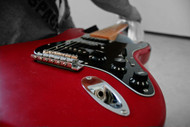Guitar String Care 101: Simple Maintenance Tips
Nov 29th 2023

Guitar String Care 101: Simple Maintenance Tips
Strings are the lifeblood of your guitar. We’ve discussed how different guitar strings can change an instrument’s sound and feel. But when they’re ratty, all guitar strings sound pretty much the same — which we can best describe as “bleah.” Not to mention worn-out strings feel rough and become difficult to play the way you want to.
As such, string care should be part of every player’s guitar servicing program. Even a couple of minutes before and after each session make a huge difference in your guitar’s sound. The experts at Strings and Beyond have some simple guitar maintenance tips concerning string care that will let you strum and shred the way you want.
Why Should I Clean My Guitar Strings?
Every time you touch the strings on your guitar, you’re exposing them to skin oils, sweat, dirt, dead skin, grease and more. Over time, this debris corrodes the string materials, reducing brightness, sustain and responsiveness. When left unattended, the debris builds up in the windings, accelerating the process. Even when the guitar is sitting in the case or on a stand, dust and humidity can collect on the strings and affect performance the next time you pick it up.

The surest way to restore a guitar’s tone is to change the strings. Some guitarist change their strings before every show for this reason. But when you’re playing the strings aggressively or they’re constantly exposed to debris and extreme temperatures, most strings will only last a few weeks — if not a few days. Even most professionals don’t have the time or money to swap strings that often.
Instead of draining your music budget, focus on cleaning guitar strings regularly. By removing moisture, oils and debris so they don’t corrode the materials, your guitar strings will last longer, sound better and be more comfortable. Although it will cost a little money upfront, you’ll spend a lot less than you would by constantly changing strings. You’ll also get to spend more time playing — experienced guitarists know a proper string change and intonation check can take up your entire “music time” for the day.
When Should I Clean Guitar Strings?
You should clean the strings every time you play. This may sound like a lot — but even if you’re only handling the guitar for a few minutes, oils and moisture still get on the strings, and they’ll start working their way into the metal or nylon if you let them. Not to mention, the debris eventually ends up on the frets and fretboard, leading to even more guitar maintenance down the road.
That being said, how thoroughly to clean the strings depends on several factors, including whether it’s a casual practice session or a serious gig. In a moment, we’ll go into more detail about guitar string cleaning techniques. Before that, though, let’s look at some of the guitar maintenance tools and accessories you may need.

Products for Guitar String Care
First things first: do not under any circumstances use household cleaners on your strings. Not only is that a one-way ticket to bleah-town, but even organic cleaners have ingredients that are likely to damage the guitar body, fretboard and hardware.
Instead, stick to cleaners and accessories formulated specifically for guitars. Here’s what we recommend having in your case or toolbox:
- At least one microfiber cloth for applying cleaners or simply wiping down the strings. They don’t leave lint and residue like other fabrics, making them ideal for cleaning.
- A bottle of guitar string cleaner. Basic cleaners remove oils and build-up while string conditioners also partially restore the strings and add a layer of protection against future corrosion.
- Though not necessary, you may also want guitar string lubricant. This gives the strings a slicker feel so you can play faster and smoother. Many times, string lubricant doubles as a cleaner, but not always.
Guitar maintenance kits such as the D’Addario Premium Instrument Care/Cleaning Kit are also available. They include string cleaning supplies plus everything else to maintain a guitar.
How to Clean Guitar Strings
There are two basic processes for guitar string maintenance: cleaning them for practices and for recording sessions and shows. If you’re just planning to tinker on the guitar in your bedroom or casually jam with friends. You don’t need to do a whole lot. The big thing is to wipe the strings, neck and pickups down with your microfiber cloth before and after you play. You should also wipe off the fretboard and body post-practice. Before playing, wash your hands with soap and water to remove oils, food debris or anything else that may be lingering.
As for shows and laying down tracks, or if you had a long practice, use your string cleaner or lubricant as soon as possible after the gig is over — and maybe even between sets. For spray cleaners, simply spray two to three times onto a clean microfiber towel and rub the strings down. Other cleaning bottles, such as D'Addario XLR8-String Lubricant and Cleaner, have a pad for applying directly to the strings. Some of these even condition your fretboard; for those that don’t, set a towel under the strings as you clean to catch drips. (You should also have a microfiber towel on stage to wipe sweat off your hands between songs.)

Final Thoughts
No guitar string lasts forever, and you will eventually need a new set. Read our guide about When to Change Your Guitar Strings for more on this subject. Still, the difference between strings lasting a few weeks and a few months is huge. Make sure to clean your guitar strings regularly and check the Strings and Beyond blog often for more guitar care tips.

